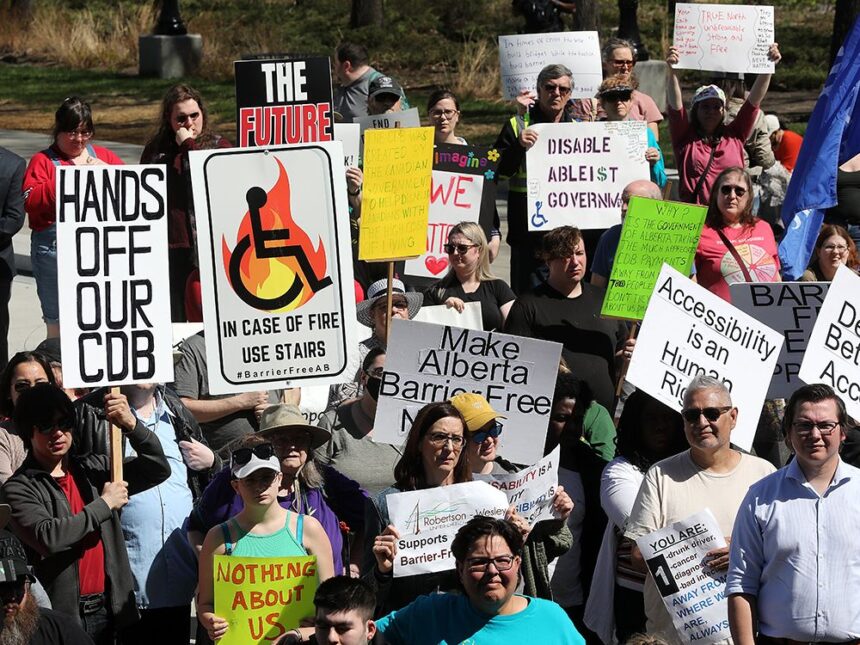Today at the Alberta Legislature, the scene was a powerful reminder of community activism at its most necessary. Hundreds of Edmontonians gathered on the legislature grounds, many in wheelchairs or using mobility aids, holding signs with messages like “Disability Rights Are Human Rights” and “No More Clawbacks.”
This marks the third major disability rights protest in Edmonton this year, but speaking with organizers, there’s a feeling that momentum is finally building. The issue at hand is deceptively complex yet fundamentally about dignity.
“We’re fighting for the basic right to live above the poverty line,” explained Marisa Reyes, an activist who has navigated life with cerebral palsy while advocating for disability rights for over a decade. “When the federal disability benefit gets clawed back from our provincial AISH payments, we’re left in the exact same financial position – still struggling.”
The mathematics of the situation reveals the frustration. Alberta’s Assured Income for the Severely Handicapped (AISH) program provides recipients with $1,787 monthly. When the new federal disability benefit of $400 is factored in, provincial regulations currently allow for dollar-for-dollar deductions from AISH payments.
The result? No actual increase in total income for those most vulnerable.
“It’s like someone offering you a gift and then someone else taking it away before you can even open it,” said James Fulton, who attended the protest with his support dog, Echo. “The provincial government needs to stop this practice immediately.”
The gathering stretched beyond disability advocates to include healthcare workers, social service providers, and allies from various walks of life. Patricia Klassen, a registered nurse who works with disabled patients, spoke passionately about what she witnesses daily.
“I see people making impossible choices between medication and food. Between heating their homes and paying for accessible transportation. This isn’t just about money – it’s about recognizing human worth,” Klassen told me while helping distribute water to protesters in the warm June sunshine.
What makes this protest different from previous efforts is the coalition that has formed. The Edmonton Disability Action Coalition has united over 25 local organizations in demanding provincial legislation that protects federal benefits from clawbacks.
Dr. Michael Sorenson from the University of Alberta’s Department of Political Science observed the protest and offered some context. “What we’re seeing is the culmination of years of advocacy work. The pandemic exposed and worsened inequalities for disabled Albertans, and now there’s a more organized response.”
The provincial government has defended the clawback policy, suggesting that AISH already provides comprehensive support and that allowing both benefits would create inequities between different support systems.
This reasoning finds little sympathy among protesters like Devon Williams, who has lived with multiple sclerosis for eight years. “They talk about ‘inequity’ while we talk about survival. The average one-bedroom apartment in Edmonton now costs more than what AISH provides. The math doesn’t work.”
Williams’ point is supported by recent data from the Edmonton Social Planning Council showing that AISH recipients would need at least $2,300 monthly to meet basic needs in our city.
What struck me most while walking through the crowd was the diversity of experiences represented. Young adults with developmental disabilities stood alongside seniors with age-related mobility challenges. Veterans with service-related disabilities shared space with those born with conditions requiring lifelong support.
Kelly Cardinal, an Indigenous disability advocate from Enoch Cree Nation, emphasized how these issues disproportionately impact Indigenous communities. “We face multiple barriers – both as Indigenous people and as people with disabilities. The systems weren’t built for us, but we’re here to rebuild them.”
The protest concluded with organizers delivering a petition with over 15,000 signatures to the Legislature office. Their demands include immediate protection of federal benefits from provincial clawbacks and the formation of a disability advisory council with decision-making authority.







